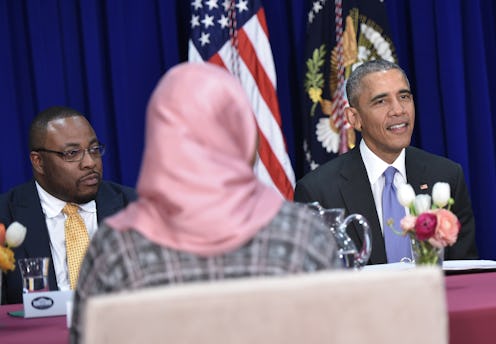News
Why President Obama Won't Say 'Radical Islam'
In the aftermath of the June 12 Orlando, Florida, shooting that left 49 dead and injured more than 53 others, President Obama made a speech giving his remarks on the situation. "We know enough to say that this was an act of terror and an act of hate. And as Americans, we are united in grief and in outrage, and in resolve to defend our people." But throughout his speech, Obama never said the words "radical Islam," which are often used in discussions about ISIS-related terror attacks. But there's an important reason why Obama won't say "radical Islam," and it has a lot to do with renouncing ISIS' motives and ideologies.
After Obama's speech, Donald Trump released an official statement on his website calling for Obama to step down because he didn't use the phrase "radical Islam" when talking about the Orlando incident. "We need to protect all Americans, of all backgrounds and all beliefs, from Radical Islamic Terrorism - which has no place in an open and tolerant society. Radical Islam advocates hate for women, gays, Jews, Christians and all Americans," Trump wrote in his statement.
Clearly unhappy with Trump's own radical behavior, Obama actually held a separate conference in which he explained why he refuses to say "radical Islam" when discussing these type of terrorist attacks.
When first addressing the Orlando shooting, Obama made a particularly salient point about American values and the way we understand those values in light of terror attacks: "No act of hate or terror will ever change who we are or the values that make us Americans," Obama said in his speech.
That line is particularly important in understanding why he won't use this notorious phrase; one major American value is refusing to give into terrorists' demands, and saying "radical Islam" would give into ISIS' hopes of being recognized as an organization whose violent actions represent an entire religion.
Obama later explained in his speech defending his aversion to "radical Islam" that this phrase accomplishes nothing in the fight against terrorism:
What exactly would using this label accomplish? What exactly would it change? Would it make ISIL less committed to trying to kill Americans? Would it bring in more allies? Is there a military strategy that is served by this?
The answer, is none of the above. Calling a threat by a different name does not make it go away. This is a political distraction.
Using "radical Islam" — whether in the context of a fight against "radical Islam" or a "radical Islamist terrorist attack" — only helps to validate ISIS by giving them what they want; this phrase, Obama said in his validation speech, frames the war against ISIS as a war between the West and Islam, the religion. By pitting the U.S. against the religion of Islam risks alienating Muslim Americans, Muslim nations that we consider our allies, and anyone in the world who observes the Islamic religion but does not observe the radical ISIS ideologies.
Obama clarified this point in his speech:
They want us to validate them by implying that they speak for those billion-plus people, that they speak for Islam. That's their propaganda, that's how they recruit. And if we fall into the trap of painting all Muslims with a broad brush, and imply that we are at war with an entire religion, then we are doing the terrorists' work for them.
Last December, Hillary Clinton faced scrutiny from the GOP for refusing to say "radical Islam," too. After the ISIS attacks on Paris, Clinton wouldn't say "radical Islam" to describe these attacks, and she later explained why on ABC's This Week :
It sounds like we are declaring war against a religion. It doesn't do justice to the vast number of Muslims in our country and around the world who are peaceful people. Number two, it helps to create this clash of civilizations that is actually a recruiting tool for ISIS and other radical jihadists who use this as a way of saying, 'We are in a war against the West -- you must join us.'
Clinton had the right idea back in December 2015 when she, like Obama, decided not to use this phrase when describing terrorist attacks, specifically ISIS related attacks. However, just this week Clinton flipped the script and used the phrase "radical Islamism," pretty much going against everything she and Obama have stood for when refusing to use this label.
It's important to keep Obama's reasons for refusing to say "radical Islam" in mind when we're discussing these tragic terrorist events that, unfortunately, have been all too common in the past year. Islam is different from other religions in many ways, but framing ISIS' senseless attacks as a representation of an entire group of "radical" people, an entire "radical" religion, isn't just inaccurate, it's dangerous to a Democratic society that has been founded on including all people.
